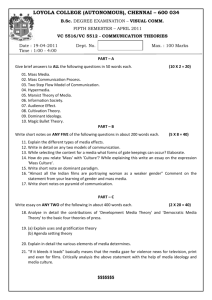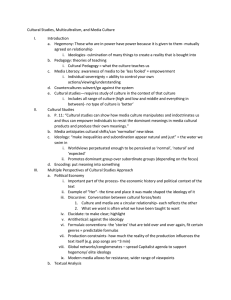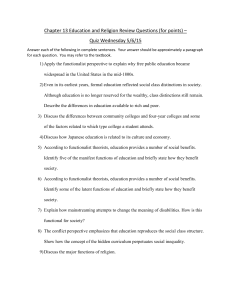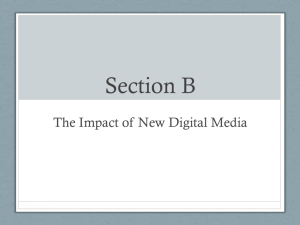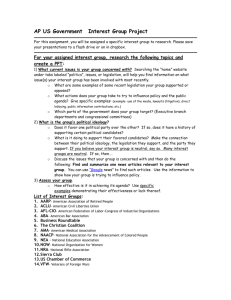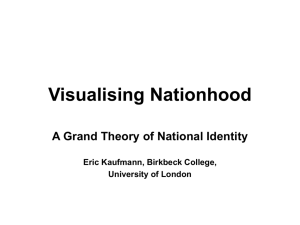SOCIOLOGY 120 Perspectives on Culture ESSENTIAL LEARNING
advertisement
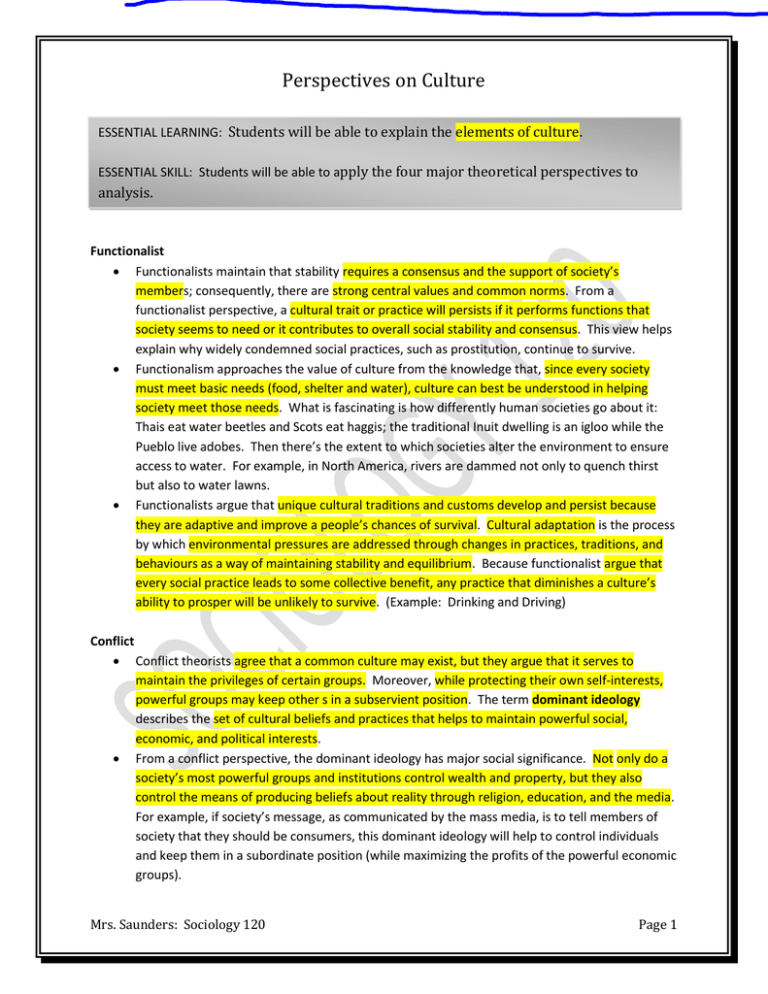
Perspectives on Culture ESSENTIAL LEARNING: Students will be able to explain the elements of culture. ESSENTIAL SKILL: Students will be able to apply the four major theoretical perspectives to analysis. Functionalist Functionalists maintain that stability requires a consensus and the support of society’s members; consequently, there are strong central values and common norms. From a functionalist perspective, a cultural trait or practice will persists if it performs functions that society seems to need or it contributes to overall social stability and consensus. This view helps explain why widely condemned social practices, such as prostitution, continue to survive. Functionalism approaches the value of culture from the knowledge that, since every society must meet basic needs (food, shelter and water), culture can best be understood in helping society meet those needs. What is fascinating is how differently human societies go about it: Thais eat water beetles and Scots eat haggis; the traditional Inuit dwelling is an igloo while the Pueblo live adobes. Then there’s the extent to which societies alter the environment to ensure access to water. For example, in North America, rivers are dammed not only to quench thirst but also to water lawns. Functionalists argue that unique cultural traditions and customs develop and persist because they are adaptive and improve a people’s chances of survival. Cultural adaptation is the process by which environmental pressures are addressed through changes in practices, traditions, and behaviours as a way of maintaining stability and equilibrium. Because functionalist argue that every social practice leads to some collective benefit, any practice that diminishes a culture’s ability to prosper will be unlikely to survive. (Example: Drinking and Driving) Conflict Conflict theorists agree that a common culture may exist, but they argue that it serves to maintain the privileges of certain groups. Moreover, while protecting their own self-interests, powerful groups may keep other s in a subservient position. The term dominant ideology describes the set of cultural beliefs and practices that helps to maintain powerful social, economic, and political interests. From a conflict perspective, the dominant ideology has major social significance. Not only do a society’s most powerful groups and institutions control wealth and property, but they also control the means of producing beliefs about reality through religion, education, and the media. For example, if society’s message, as communicated by the mass media, is to tell members of society that they should be consumers, this dominant ideology will help to control individuals and keep them in a subordinate position (while maximizing the profits of the powerful economic groups). Mrs. Saunders: Sociology 120 Page 1 Perspectives on Culture Conflict theory views society as based on tension and conflict over scarce resources. Conflict theorists assert that those who hold power define and perpetuate a culture’s ideology, and create a value system that defines social inequality as just and proper. Conflict theorists view the link between money and success as an expression of the ruling elite’s power and influence. Further exploitation comes in the form of imitation. Having the right car, clothes, and homes, and eating in the right restaurants and drinking the right kind of wine are all attempts to imitate the rich. According the Karl Marx, the dominant culture eventually becomes part of the value system of an oppressed group. Ultimately, the oppressed group begins to view its own culture as inferior and tries to improve its position by adopting the ways of the dominant culture. Interactionist Interactionists argue that social reality is the result of human interaction. As a microsociological perspective, interactionism investigates how culture is actively created and recreated through social interaction. Thus, as people go about their everyday lives, they create and modify culture as they engage in the negotiation of reality based on shared meanings grounded in cultural symbols. People interpret and actively engage with nonmaterial cultural artefacts (symbols) in every social interaction they encounter. Therefore, a social category is created by interacting individuals and manifests itself in society through negotiated social interaction. However, since these meanings are actively negotiated, there is also great potential for resisting and changing dominant cultural meanings, since they are fluid and constantly open to reinterpretation and reflection. According to interactionists, then, culture is the set of symbols to which society collectively assign values and the result of individuals’ active engagement with others. Feminist Some feminist thinkers would argue that the mass media, acting as mouthpieces of the dominant ideology, contribute to the control and marginalization of women. The mass media communicate to their readers, viewers, and listeners the message that women’s value in society is based on their sexual attractiveness, their domestic skills, their roles as mothers and wives, their adeptness at staying fit and appearing youthful, and their abilities to provide support and comfort to others. Some feminist perspectives advocate that the mass media’s portrayal of women as powerless, child-like sex objects contributes to cultural norms, beliefs and values that reinforce and perpetuate patriarchy as a dominant ideology. Mrs. Saunders: Sociology 120 Page 2
